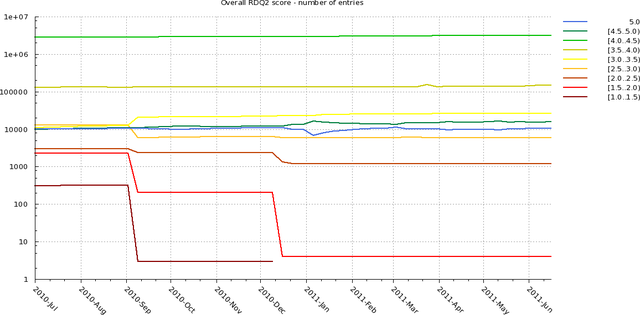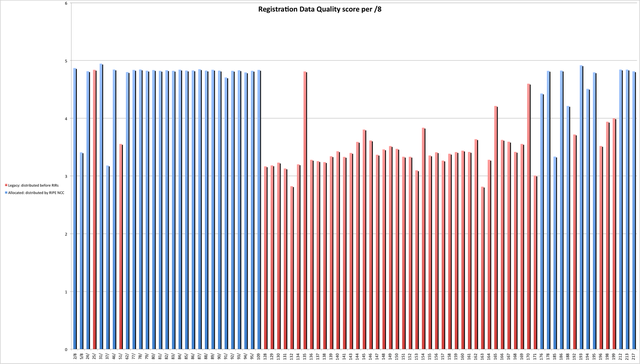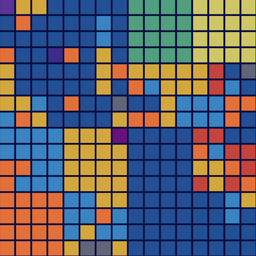In order to ensure accurate and up-to-date registration data, the RIPE NCC started to evaluate Registry Data Quality (RDQ) in 2009. The second phase has now been finalised and the results are encouraging.
Summary
Accurate registration data is essential for the global registry system. To ensure that the RIPE Registry’s data is correct, up-to-date and accurate, the RIPE NCC regularly checks the Registry data to fix inconsistencies and outdated information. We analysed the results of our most recent efforts, “Ensuring Registry Data Quality - Phase Two (RDQ2)”, and were pleased to find that 96.09% of entries in the RIPE Database are considered accurate.
More information on the first phase of RDQ is here: Ensuring Registry Data Quality
Why Data Quality is Important
The purpose of keeping a registry of allocated and assigned Internet number resources is to ensure that IP address space is uniquely assigned and that the legitimate user can be identified and contacted. This is especially relevant now because IPv4 is nearing depletion and it is anticipated that Local Internet Registries (LIRs) will want to transfer address space. When transferring space between LIRs, it is especially critical that the registration information is accurate. There are also risks associated with outdated registration data, including hijacking, problematic Internet routing and conflicts between LIRs.
The Methodology of RDQ2
First we went through all of our data sources to make sure that any IPv4 address space allocated or assigned by the RIPE NCC was correctly recorded in the RIPE Registry. We looked at the following sources:
- The IANA IP Registry
- The RIPE NCC’s Public Resource Files (“stats files”)
- The public stats files of other Regional Internet Registries (RIRs)
- Routing Information Service (RIS)
- RIPE NCC internal membership database
- The RIPE Database
High Data Quality for RIPE NCC-Distributed Space
We weighted the various data sets found for each IPv4 address range according to a number of predefined rules, tagging each data set with a score from 0-5. A score of “0” means we are not confident that the data is accurate, and a score of “5” means we are extremely confident of the data quality.
Out of more than 3.4 million entries examined, 96.09% scored extremely high with an average score of 4.5/5. The remaining 3.91% scored an average of 3/5. You can see this in Figure 1 below. Each colour represents a different range of scores with the reddish colours indicating low confidence in the registration data. Note that the number of addresses on the y-axis is plotted using a logarithmic scale. You can see that over time we succeeded in reducing the number of addresses in the most problematic scores.
(You can enlarge the images by clicking on them.)

Figure 1: Overall RDQ2 score per number of entries
We categorised the IP address ranges into two categories:
- Address space distributed by the RIPE NCC (marked blue in Figure 2 below)
- Legacy address space registered in a different registry prior to the formation of the RIR system and inherited by the RIPE NCC (marked red in Figure 2 below)
Our assessment revealed that the highest scoring entries belonged to IPv4 address space distributed by the RIPE NCC.
We then looked at the confidence score for each /8 from which the RIPE NCC registers addresses (you can see the results in Figure 2 below). The highest scoring /8s are generally those marked “ALLOCTED-PA” in the RIPE Database and announced on the global routing table; it makes sense for these LIRs and End Users to have regular contact with the RIPE NCC and ensure that their registrations are kept up-to-date.
The lowest scoring /8s tend to be legacy space, and in these cases the LIR is not necessarily in regular contact with the RIPE NCC. In many of the /8s designated legacy space, the RIPE NCC inherited only parts of that /8. The RDQ score for legacy /8s represents our confidence in the registration data for only those address ranges registered in the RIPE Database. The legacy space also includes “orphaned” address space with no current LIR listed; this is often the result of mergers and acquisitions between organisations.

Figure 2: Registry Data Quality score per /8
Conclusion
While 96.09% of the entries we looked at scored extremely high on the confidence scale, we will continue to work towards closing the gap on the lower-scoring 3.91%. We are doing this on an ongoing basis by cleaning up overlapping entries. We will also continue to monitor the registrations that score well today in order to catch any deterioration of registration quality.
We are also in the process of contacting legacy space holders and urging them to update their registration data, and RIPE Policy 2007-01, "Contractual Requirements for Provider Independent Resource Holders in the RIPE NCC Service Region", is now in its third phase of implementation.
All of these efforts will strengthen the RIPE Registry’s data quality. If you’re a resource holder, we encourage you to take a moment to make sure that your registrations are updated in the RIPE Database today.
Appendix
1.0 Examples of Low-Scoring /8s
51/8 scored quite low for a variety of reasons: it was allocated prior to the establishment of the RIR system, there is no placeholder object for it in the RIPE Database and the address space is not routed globally.
132/8 also scored low. Similar to 51/8, this range is considered legacy address space. The RIPE NCC did not have contact for long time with the holder of this address space and it is not maintained by an LIR at the moment. The prefix is also not routed globally.
This block contains a mix of legacy space and address ranges that have been allocated by the RIPE NCC and later by AfriNIC. AfriNIC uses the RIPE Internet Routing Registry. Accordingly, RPSL allowed the creation of entries coming from 196/8.
1.2 Examples of High-Scoring /8s
176/8 scored highly. IANA allocated this address range to the RIPE NCC in May 2010. Over time, many of the address holders (LIRs and End Users) have updated existing entries in the RIPE Database. Most of the address space is held by active LIRs that have maintained regular contact with the RIPE NCC. Most of the ranges in this block are announced on the global routing table.
135/8 also scored highly. The entire /8 is registered as one entry in the RIPE Database. This block was transferred to the RIPE NCC as part of the Early Registration Transfer (ERX) and is now registered as ALLOCATED-PA to an organisation with good registration records.
2.0 Contacting Legacy Space Resource Holders
Returning Unannounced Legacy Address Space (November 2010)
- The RIPE NCC contacted the holders of unannounced legacy IPv4 address space and encouraged them to return the addresses.
Status of Legacy IPv4 Address Space (September 2011)
- This article summarises the responses we received after contacting the holders of unannounced legacy IPv4 address space
2.1 Implementation of Phase 3: "Contractual Requirements for Provider Independent Resource Holders in the RIPE NCC Service Region".
http://www.ripe.net/ripe/docs/ripe-518







Comments 0
The comments section is closed for articles published more than a year ago. If you'd like to inform us of any issues, please contact us.